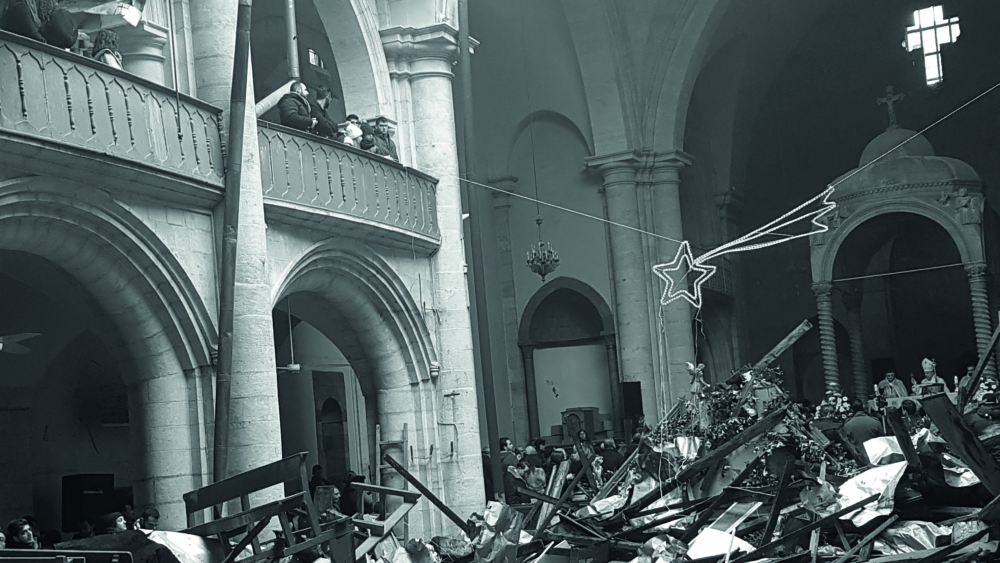Hope survives under pressure in the Middle East
‘After waves of persecution … there are always flourishing, promising stories’
This Q&A has been adapted from an interview with Mike Bassous, General Secretary of the Bible Society in Lebanon. It was featured on the Philadelphia Promise podcast about ‘Christians Under Pressure’. The podcast was released in October, 2019.
As the leader of a Bible Society in the Middle East, where Christians are under incredible pressure, how important to you is this promise to ‘resource mission where Christians are under pressure’?
Mike Bassous: The concept of Christians under pressure is a common theme for Christians everywhere. If you are to live your Christian witness in the way that our Lord asked us to – and that is to be witnesses for and carrying our crosses, declaring what is truth – you will be under pressure wherever you are, even in developed countries, in western countries.
Because I’ve lived all my life in the Middle East, I’ve seen that happen, but I’ve also seen that after a movement of persecution you will always see the church flourishing again. Maybe one of the best-case scenarios we can mention at the moment is Qaraqosh in the Nineveh Plain in Iraq, where it was completely emptied and destroyed. Now half of the Christian population and families are back in their towns and we expect the other half to return. So there are always flourishing, promising, hopeful stories after waves of pressure and persecution.
The reality is that when you are under pressure the last thing you want to worry about is, ‘Can I make ends meet?’ There is an opportunity here to support our brothers and sisters who have been under a lot of pressure. And these are windows of opportunities. It’s a timely opportunity.
Describe some of the kinds of pressures that Christians are facing and how that helps to shape Bible ministry.
MB: It depends where you are in the region, especially in the Middle East; there are different types of pressures. The most obvious thing is that sometimes Christians don’t feel welcomed any more, although the land – the Middle East – is the land of Christianity, and they were first called Christians in Antioch.
In other areas, we’re talking about serious survival issues with Christians. Their homes were destroyed, churches were destroyed, Bibles gone, disappeared, burned.
“One in every three people you meet in the street has some sort of refugee status.” – Mike Bassous
I know the Archbishop of Mosul of the Syriac Orthodox Church has asked us for 1,000 Arabic Bibles to give out to the families that have returned to the nearby villages of Mosul. A very simple need but very prevalent for them.
So the needs vary depending on what the Christian community has been through. But it can be as soft as feeling unwanted, to as hard as ‘I’ve lost everything I own including my Bible and we’re traumatised and need help’ – and so the Bible Society has to be prepared to meet both types of needs.
Lebanon is hosting more than one million refugees, many of whom have fled war or persecution. How has this affected your Bible Society’s work?
MB: Right now, we host about one million formal refugees and half a million not registered. The statistics say that one in every three people you meet in the street has some sort of refugee status.
I can just mention a few examples of how we are serving them. First, with Scriptures, because many have landed in Lebanon without having their own copies of the Word of God.
Trauma healing – as I speak, there are equipping sessions happening. So far in Lebanon, we have equipped – between Lebanon, Syria and Iraq – more than 450 volunteers to go out and deal with families who have been traumatised.
“I actually leave the place supported and encouraged by them.” – Mike Bassous
We’ve started our own children’s trauma healing program, so we’ve started dealing not only with the parents but also with the children. And very soon one will be focused on teenagers who are probably at the most difficult stage for trauma.
Coupled with that we noticed that there would be an issue of literacy. Just imagine, in Lebanon today, out of every ten newborns, six are refugees. Where are they growing up? What kind of schooling are they getting? What kind of minimum atmosphere of feeling and belonging?
So, we are quite involved in Bible-based literacy programs, again with churches who have adopted these refugees and are helping them overcome the crisis they are going through.
Any prayer pointers that you can give to help people pray for Christians under pressure in your own country – and in general?
MB: I believe that we will never get the full size and scope of what kind of pressures some kinds of Christian communities are under. But what I have learned from my travels in the Middle East, I am humbled very time I go to a certain area. I go with the mentality that I am going to support and encourage them – and I actually leave the place supported and encouraged by them.
This is something we don’t realise – that when you are under pressure and there is persecution, these people are getting a blessing at the same time and sharing a blessing with us who may think we are going there to bless them or support them.
So I think the best way is to keep praying, understanding that yes, they are going through specific difficult times, but they are getting the blessing of walking on the path that our Lord Jesus Christ walked.

